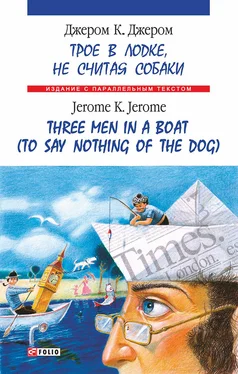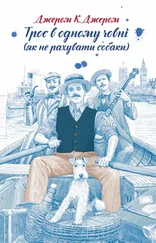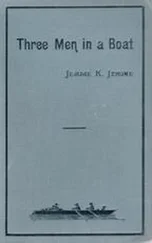Neither the beef nor the strawberries and cream seemed happy, either – seemed discontented like.
At six, they came and told him dinner was ready. The announcement aroused no enthusiasm within him, but he felt that there was some of that two-pounds-five to be worked off, and he held on to ropes and things and went down. A pleasant odour of onions and hot ham, mingled with fried fish and greens, greeted him at the bottom of the ladder; and then the steward came up with an oily smile, and said:
“What can I get you, sir?”
“Get me out of this,” was the feeble reply.
And they ran him up quick, and propped him up, over to leeward, and left him.
For the next four days he lived a simple and blameless life on thin captain’s biscuits (I mean that the biscuits were thin, not the captain) and soda-water; but, towards Saturday, he got uppish, and went in for weak tea and dry toast, and on Monday he was gorging himself on chicken broth. He left the ship on Tuesday, and as it steamed away from the landing-stage he gazed after it regretfully.
“There she goes,” he said, “there she goes, with two pounds’ worth of food on board that belongs to me, and that I haven’t had.”
He said that if they had given him another day he thought he could have put it straight.
So I set my face against the sea trip. Not, as I explained, upon my own account. 1 was never queer. But I was afraid for George. George said he should be all right, and would rather like it, but he would advise Harris and me not to think of it, as he felt sure we should both be ill. Harris said that, to himself, it was always a mystery how people managed to get sick at sea – said he thought people must do it on purpose, from affectation – said he had often wished to be, but had never been able.
Then he told us anecdotes of how he had gone across the Channel when it was so rough that the passengers had to be tied into their berths, and he and the captain were the only two living souls on board who were not ill. Sometimes it was he and the second mate who were not ill; but it was generally he and one other man. If not he and another man, then it was he by himself.
It is a curious fact, but nobody ever is sea-sick on land. At sea, you come across plenty of people very bad indeed, whole boatloads of them; but I never met a man yet, on land, who had ever known at all what it was to be sea-sick. Where the thousands upon thousands of bad sailors that swarm in every ship hide themselves when they are on land is a mystery.
If most men were like a fellow I saw on the Yarmouth boat one day, I could account for the seeming enigma easily enough. It was just off Southend Pier, I recollect, and he was leaning out through one of the port-holes in a very dangerous position. I went up to him to try and save him.
“He! come further in,” I said shaking him by the shoulder. “You’ll be overboard.”
“Oh my! I wish I was,” was the only answer I could get; and there I had to leave him.
Three weeks afterwards, I met him in the coffee-room of a Bath hotel, talking about his voyages, and explaning, with enthusiasm, how he loved the sea.
“Good sailor!” he replied in answer to a mild young man’s envious query; “well, I did feel a little queer once, I confess. It was off Cape Horn. The vessel was wrecked the next morning.”
I said:
“Weren’t you a little shaky by Southend Pier one day, and wanted to be thrown overboard?”
“Southend Pier!” he replied with a puzzled expression.
“Yes; going down to Yarmouth, last Friday three weeks.”
“Oh, an – yes,” he answered, brightening up; “I remember now. I did have a headache that afternoon. It was the pickles, you know. They were the most disgraceful pickles I ever tasted in a respectable boat. Did you have any?”
For myself, I have discovered an excellent preventive against seasickness, in balancing myself. You stand in the centre of the deck, and, as the ship heaves and pitches, you move your body about, so as to keep it always straight. When the front of the ship rises, you lean forward, till the deck almost touches your nose; and when its back-end gets up, you lean backwards. This is all very well for an hour or two; but you can’t balance yourself for a week.
George said:
“Let’s go up the river.”
He said we should have fresh air, exercise and quiet; the constant change of scene would occupy our minds including what there was of Harris’s; and the hard work would give us a good appetite, and make us sleep well.
Harris said he didn’t think George ought to do anything that would have a tendency to make him sleepier than he always was, as it might be dangerous. He said he didn’t very well understand how George was going to sleep any more than he did now, seeing that there were only twenty-four hours in each day, summer and winter alike; but thought that if he did sleep any more, he might just as well be dead, and so save his board and lodging.
Harris said, however, that the river would suit him to a “T.” I don’t know what a “T” is (except a sixpenny one, which includes bread-and-butter and cake ad lib ., and is cheap at the price, if you haven’t had any dinner). It seems to suit everybody, however, which is greatly to its credit.
It suited me to a “T” too, and Harris and I both said it was a good idea of George’s; and we said it in a tone that seemed to somehow imply that we were surprised that George should have come out so sensible.
The only one who was not struck with the suggestion was Montmorency. He never did care for the river, did Montmorency. “It’s all very well for you fellows,” he says; “you like it but don’t. There’s nothing for me to do. Scenery is not in my line, and I don’t smoke. If I see a rat, you won’t stop; and if I go to sleep, you get fooling about with the boat, and slop me overboard. If you ask me, I call the whole thing bally foolishness.”
We were three to one, however, and the motion was carried.
Троє недужих. Страждання Джорджа і Гарріса. Жертва ста семи жахливих хвороб. Корисний рецепт. Ліки від хвороб печінки у дітей. Ми погоджуємось на тому, що перевтомились і потребуємо відпочинку. Тиждень на морських хвилях? Джордж пропонує подорож Темзою. Монтморенсі висуває заперечення. Пропозицію прийнято більшістю трьох голосів проти одного.
Нас було четверо: Джордж, Вільям-Семюел-Гарріс, я і Монтморенсі. Ми сиділи в моїй кімнаті, курили й розмовляли про те, що ми нікуди не годимося – тобто, звичайно, з погляду здоров’я.
Усі ми почували себе кепсько, і це вже неабияк тривожило нас. Гарріс сказав, що в нього інколи якось дивно паморочиться в голові і він тоді сам не тямить, що робить. Джордж озвався, що й у нього теж буває таке запаморочення, коли він сам не тямить, що робить. Ну а в мене було не гаразд із печінкою. Я знав, що в мене розладналась печінка, бо щойно прочитав рекламу патентованих пілюль від печінкових хвороб, де були описані різні симптоми, за якими можна визначити, що у вас хвора печінка. І всі ті симптоми я знайшов у себе.
Читать дальше



![Джером Джером - Троє в одному човні (як не рахувати собаки) [збірка]](/books/173712/dzherom-dzherom-troЄ-v-odnomu-chovnІ-yak-ne-rahuvati-thumb.webp)







![Helen Rowland - The Widow [To Say Nothing of the Man]](/books/752764/helen-rowland-the-widow-to-say-nothing-of-the-man-thumb.webp)